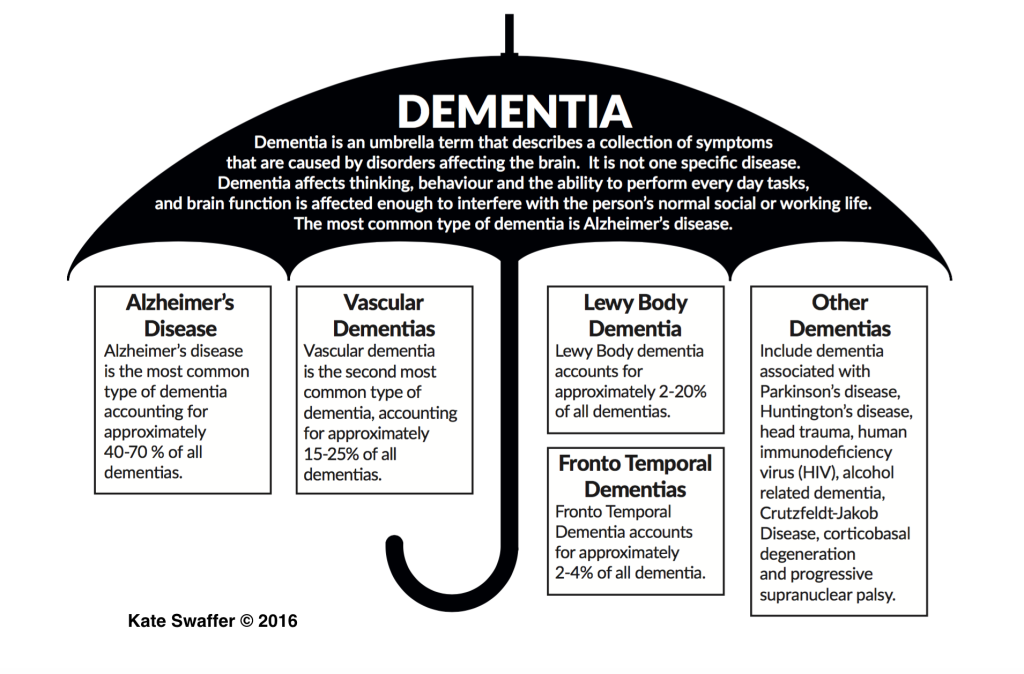About: dementia
‘Dementia’ is an umbrella term for a range of conditions, with some of the most well known being Alzheimer’s disease, vascular dementia, Lewy body dementia, frontotemporal dementia and mixed dementia. Dementia is not a singular disease but a syndrome, since it can result from multiple different diseases that cause a range of cognitive impairment symptoms, including memory loss and problems with reasoning, perception and communication skills.
There are around 55 million people living with dementia in the world today and this is expected to triple by 2050 [1]. Dementia is a chronic condition. This means that people who are diagnosed with dementia live with it for the rest of their lives. In the UK alone, there are currently estimated to be around 900,000 people living with dementia [2]. This figure is anticipated to increase in the future due to the country’s ageing population. Dementia is a major public health challenge in the UK, where the costs of care are estimated to be around £13.5 billion [3], with the costs of ‘unpaid’ care in the country understood to be even higher. As the incidence of dementia increases in the UK, it is anticipated that these costs will increase too.

- [1] World Health Organization. (2022). Dementia [online]. URL: https://www.who.int/news-room/fact-sheets/detail/dementia.
- [2] Alzheimer’s Society. (2022). What is dementia? [online]. URL: https://www.alzheimers.org.uk/about-dementia/types-dementia/what-is-dementia.
- [3] Alzheimer’s Society. (2022). What are the costs of dementia care in the UK? [online]. URL: https://www.alzheimers.org.uk/about-us/policy-and-influencing/dementia-scale-impact-numbers.
About: dementia stigma

Many people receiving a dementia diagnosis must not only live with the condition, but also with the stigma that surrounds it. Dementia stigma can negatively impact the lives of people living with dementia and their families in a wide range of ways, such as by creating feelings of shame and making them less likely to seek medical support and take part in research. In the UK, dementia stigma has also been found to distort service standards at all levels of healthcare, from funding decisions to service commissioning and frontline care. In other words, dementia stigma is harmful not only for the quality of life of people with dementia but also, potentially, for their life chances too. Dementia stigma is also likely to have implications for the wider public, as it has been found to create fear and misunderstanding of the syndrome, as well as negative attitudes towards people living with it. The harm done by dementia stigma is thus widespread and deep, having implications not only for the health and quality of life of those most affected by the syndrome, but for society as a whole.
The way we talk and communicate about dementia, including our use of language and imagery, has the power to shape our attitudes towards it and, for people diagnosed with dementia, how it is experienced. Unfortunately, much communication about dementia in the public domain, such as in the media, is negative and sensationalistic, foregrounding its threat and presenting a dementia diagnosis as an effective death sentence. People living with dementia, meanwhile, are presented as hazardous and lesser versions of their past selves. Such portrayals have been found to have harmful effects on people living with dementia and their families, to create fear and misunderstanding in the public, and are more likely to add to dementia stigma than to challenge it.
About: this project
This research project will challenge dementia stigma by changing the ways in which dementia is discussed in the public domain in the UK, focusing in particular on news media, public health bodies, charities, social media and online dementia support groups. Understanding how the language and imagery associated with communication about dementia in these contexts relate to, but also vary between, one another can help us to assess the potential effects of dementia representation in one situation on another.
To achieve these aims, we are working closely with people with dementia, charities, advocacy groups and representatives from the mainstream media to implement changes to communicative practices around dementia in ways that challenge dementia stigma through the development of communication guidelines and the delivery of training. Crucially, closely collaborating with people with dementia can help ensure that the often-overlooked voices of people who are experts through experience are heard and valued not only in public discourse but in the research process itself.
